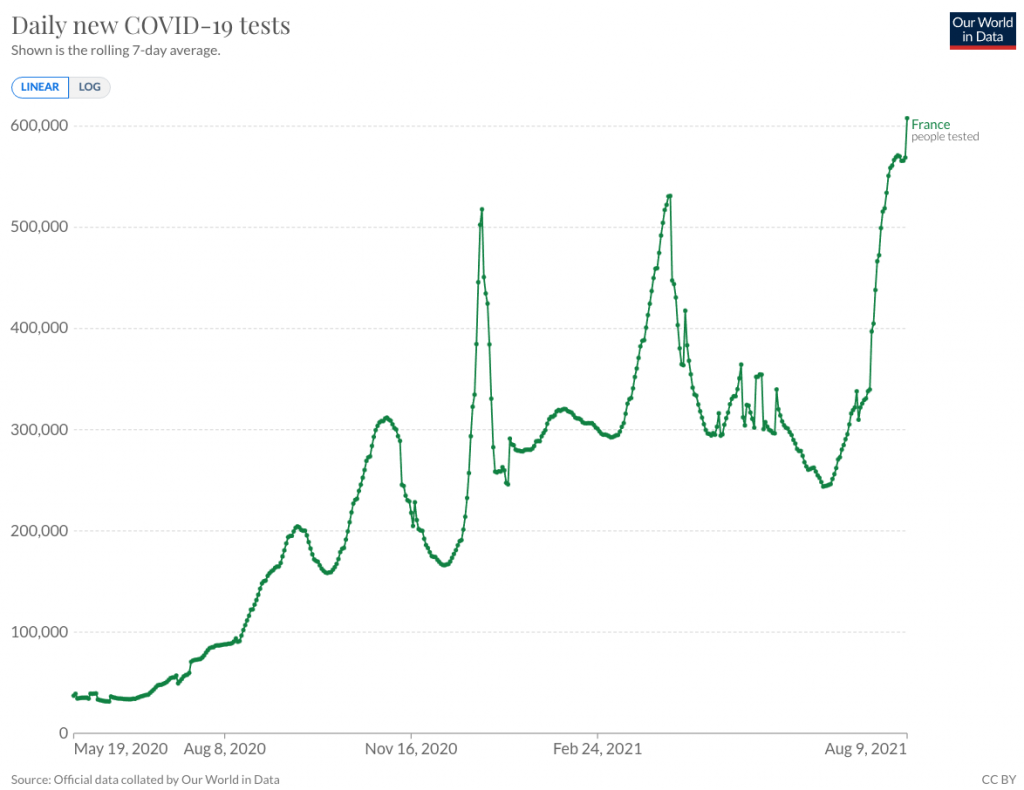There follows a guest post by former Google software engineer Mike Hearn.
I just got back the south of France, flying from Switzerland. Myself and my fiancée visited Antibes and its local theme parks. The Pass Sanitaire came shortly before we arrived, so I got to see how it was doing on its first days of implementation.
Polling from the end of July stated that about half of the French are opposed to the anti-pass protests, about 35% are supportive and about 15% are indifferent. How does it look on the ground? I decided to do a simple experiment to find out: always present an expired test even though I had a valid negative one, and see what happens. Over a four day stay I was required to show a valid pass exactly zero times; that includes at the airports in both directions. Compliance is absolutely min viable and often lower. At small businesses enforcement was non-existent: sometimes the pass requirement was ignored entirely, other times we were asked “do you have a pass” and our answer wasn’t checked. One restaurant had come up with a clever way to detect police stings without requiring customers to actually present a pass. As expected, enforcement was stricter by larger firms, however even there we saw the following:
- Test certificates being checked once and then swapped for a token that doesn’t expire.
- Expired tests being accepted.
- People accepting paper test certificates without scanning them.
- Scanning tests and then not looking at the screen to see the results.
- Accepting QR codes that failed to scan.
We saw no evidence of compliance checks being done on businesses, although it was only a short stay. We saw only one person voluntarily present a pass when it wasn’t being requested, and that person was unsurprisingly quite elderly.
Mask enforcement has collapsed. In the theme parks nobody was wearing masks despite the signs and announcements telling people it was obligatory. Even at large venues the staff frequently wear masks around their chins or dispense with them altogether. Social distancing is of course a long forgotten memory by now.
It’s a good thing enforcement is lax because the testing system is in a state of disarray. The massive throughput needs of the Pass Sanitaire mean that every pharmacy is operating rapid testing tents with staff no more trained than the average counter clerk. Despite that, there are always huge ‘queues’ (often more like a crowd milling around outside a tent). At one pharmacy, personal details had to be filled out on a smartphone while you were hanging around, but you didn’t get any kind of code or evidence you’d done so. The tester did the test, then assured me I’d get my results in 20 minutes. I had to point out that this was impossible because he had no idea who I was.
Delivery of test results also seems to be quite broken. Although the test completes within 15-20 minutes the results email frequently took hours to arrive for me. Moreover, that email did not contain the certificate. Instead you retrieve your results only after getting a code via email or SMS, which must be typed in within ten minutes. SMS codes never turned up and emails were routinely being delivered after the ten minute window had expired, meaning that actually downloading your test certificate was an exercise in frustration. My guess is the sudden spike in testing combined with the desire to use new-style digitally signed QR codes is causing automatic anti-spam throttling of messages from the Government. It’s possible they didn’t anticipate this and now have no way to fix it without removing the ‘security’ on their system.

Macron has claimed that, “Never before in our history was a crisis of such magnitude fought in such a democratic way.” In the parts we visited at least, the French are ‘democratically’ rejecting his rule by simply ignoring it. The motions are being made but on close-up inspection nothing is actually happening.
Polls vs. reality
How can this experience be reconciled with the anti-protest polling?
One answer is that the beliefs of a composite/average French person don’t actually matter here. The scheme is most popular with the elderly and public sector workers, least popular with the young and business owners. But retirees and government workers aren’t the ones waiting tables or selling tickets. Nor are they the employers of the people who do. In fact, among company managers, sympathy for the protests rises to 60%; higher than private sector workers as a whole. We may also assume that plenty of people are against the Pass Sanitaire while also being against protests, which have a history of being violent and disruptive in France, and it seems safe to assume that support for it will fall further as the system actually starts to bite (the poll pre-dates enforcement). Thus the true levels of support for the pass amongst the managerial classes are certainly much lower than the 40% this poll would imply.
Finally, not for the first time, we must raise eyebrows at polling that paints a totally different picture of what people think than what is observable with our own eyes. Polling firms try hard to ensure their sample is representative, but it’s been known for many years that their samples are not genuinely reflective of the population under test. A large but very predictable problem is that polls massively over-represent volunteers. It seems likely that there’s a correlation between the sort of people who support the Pass Sanitaire and the sort of people who enthusiastically volunteer to spend time on surveys without compensation. In the past I’ve encountered a belief among (ex) professional pollsters that it’s an open secret in the business that any question with a “pro-social” answer will get wildly un-representative answers. However, I’ve never been able to find any kind of rigorous written discussion of this. If you work or have worked in polling and have some insight to offer here, please do get in touch and share it. Enquiring minds would like to learn more!
Conclusion
Converting ordinary businesses into an unpaid police force cannot work without high levels of support amongst the young and entrepreneurial. The Pass Sanitaire doesn’t have that. Implementation difficulties leading to arbitrary and random arrests will only further erode support for the scheme.











To join in with the discussion please make a donation to The Daily Sceptic.
Profanity and abuse will be removed and may lead to a permanent ban.
I’m surprised it was so little. Were the flags and whatnot hung up and taken down by volunteers free of charge? Was there no formal risk management effort expended? There may not be a line item for it but I’ll bet the lost opportunity costs were far higher than half a million quid.
100%. I would bet it was several orders of magnitude greater than £500k across the entire public sector.
And added to the ‘P’ tax payer bill is all the money spent in schools ( mine included) on numerous flags small and impressive huge hanging ones! Party food teachers time, wigs hats and so on. The flags remained hanging like the third reich headquarters outside until the last day of term, July!!!! Not just June, Why we know! We all staff and students and visitors had to walk past them to enter or leave the building as the colours caught our every gaze, setting the scene for educational setting!!
As students left on their last day at school EVER they were clapped as they paraded past these flags and proud parents took videos and photos, just to add to the visual brainwashing as these pics will adorn family albums with cult rainbows in the background of smiling young faces as they leave their school, to brainwash the next family generations into the ‘new world not for old souls’ that now presides.
When Labour get in their ideologue canvass has been helpfully primed by the cowardly government so if you don’t wear the flag by then you will be marked out? Cancel gulags for me then.
I think the taxpayer should not be funding anything that is not core to a specific public service .
The list includes brainwashing events like this, BLM,Climate Alarmists , all charities that get any cash from any public organisation .
Also the whole Arts and Culture bandwagon .I really do not think we should be funding experimental , Lesbian Art Exhibitions from Upper Volta or similar .
Lets not forget overseas aid while we are at it beyond short term disaster relief.
Just off to complete my application for support for a 2month Christian, St George and the Hetrosexual Festival .I am sure old Khan has a pot of money put aside for such causes.
I will not be holding my breathe though ..
t
Sadiq Khan you are a clown, use the funding to but some Ronald McDonald big red boots so we can hear you flop around London, I really find it amazing,. that anyone could’ve been a bigger clown than Boris, but you are winning that crown by a mile,.resign now please, so we don’t have to listen to any more of your stupidity!!